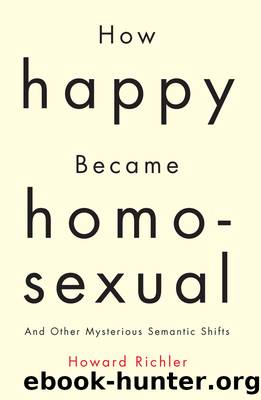How Happy Became Homosexual by Howard Richler

Author:Howard Richler
Language: eng
Format: epub
Publisher: Ronsdale Press
Published: 2013-01-15T00:00:00+00:00
In the following chapters we will look at some words that began their lives in particular fields before transcending their restricted parameters. First, we will look at words whose senses were originally in the domain of religion.
CHAPTER 6
Religion:
Oh My God!
I BELIEVE NO ONE WOULD question that, in days gone by, when most folks were God-fearing and hell-aversive, religion played a large role in the lives of individuals. As such, it is not surprising that many words derive from a religious context. It was perhaps not more than a century ago when the most common euphemisms in the English language were religious ones, and ordinary souls substituted âzoundsâ for âby Godâs woundsâ; âgadzooksâ for âGodâs hooksâ; and âdoggoneâ for âgoddamn.â Many people still use âtarnationâ for âdamnation.â Surprisingly enough, even the euphemism âgoshâ is a mincing pronunciation of âGod.â
Over time, many words that were originally based in religion have lost any hint of their theological roots in our ever more secular society. Some are fairly obvious, such as the secularizing of âcrusadeâ and âadventâ well beyond their Christian origins. Others, however, might surprise you. For example, a âparlourâ originally referred to an apartment in a monastery or convent in which residents could talk amongst themselves or with people from outside the establishment. Similarly, âcellâ originally referred to the chamber of a religious recluse. âSanctionâ was an ecclesiastical decree. âPropagandaâ designated a committee of Roman Catholic cardinals. âPatterâ meant to recite a prayer in a mechanical fashion. In the 14th century, the word âhierarchyâ referred to three divisions of angels, but by the 16th century it referred to a division in ecclesiastical concerns, and it became secularized only in the 17th century. Even âvisitâ and âcelebrityâ were highly religious; the former referred to a visitation by God to bring comfort, and the latter to a solemn rite. Here are some other words that we have secularized.
Bead
The original meaning of âbeadâ is âprayerâ or âdevotions,â a sense that is found in English before the 10th century. Because these beads or prayers were kept on what nowadays is called a rosary, a string of small balls, the word âbedeâ (later âbeadâ) came to be applied to the balls themselves. In Middle English, a beadsman referred to someone who prayed for peopleâs souls. In the early 15th century we see the word recorded to refer to a small perforated round object made of materials such as amber, glass and wood, used as an ornament, strung in a series to form a necklace or bracelet. By the end of the 16th century, âbeadâ could refer to less poetic round objects such as a âbead of sweat.â In fact, Shakespeare uses it as such in Henry IV, Part One, when he speaks of how âBeds of sweat haue stood vpon thy brow.â
Charisma
If you believe âcharismaâ is a God-given attribute, you recognize the wordâs first meaning, found in the 17th century: âA free gift or favour specially vouchsafed by God; a grace, a talent.â It was first used
Download
This site does not store any files on its server. We only index and link to content provided by other sites. Please contact the content providers to delete copyright contents if any and email us, we'll remove relevant links or contents immediately.
Cecilia; Or, Memoirs of an Heiress — Volume 1 by Fanny Burney(32536)
Cecilia; Or, Memoirs of an Heiress — Volume 2 by Fanny Burney(31933)
Cecilia; Or, Memoirs of an Heiress — Volume 3 by Fanny Burney(31925)
The Lost Art of Listening by Michael P. Nichols(7485)
Asking the Right Questions: A Guide to Critical Thinking by M. Neil Browne & Stuart M. Keeley(5751)
We Need to Talk by Celeste Headlee(5604)
On Writing A Memoir of the Craft by Stephen King(4924)
Dialogue by Robert McKee(4385)
Pre-Suasion: A Revolutionary Way to Influence and Persuade by Robert Cialdini(4208)
I Have Something to Say: Mastering the Art of Public Speaking in an Age of Disconnection by John Bowe(3871)
Elements of Style 2017 by Richard De A'Morelli(3336)
The Book of Human Emotions by Tiffany Watt Smith(3287)
Fluent Forever: How to Learn Any Language Fast and Never Forget It by Gabriel Wyner(3071)
Name Book, The: Over 10,000 Names--Their Meanings, Origins, and Spiritual Significance by Astoria Dorothy(2967)
Why I Write by George Orwell(2944)
Good Humor, Bad Taste: A Sociology of the Joke by Kuipers Giselinde(2939)
The Art Of Deception by Kevin Mitnick(2784)
The Grammaring Guide to English Grammar with Exercises by Péter Simon(2733)
Ancient Worlds by Michael Scott(2672)
